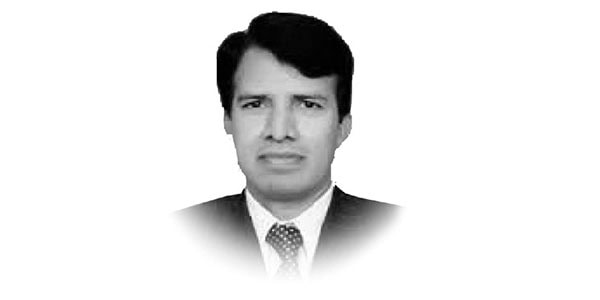Political Polarisation: A consequent of bad governance
THE extreme act of political polarisation in Pakistan was demonstrated in Saudi Arabia, once a group of Pakistani workers chanted slogans against Prime Minister Shahbaz Sharif and his cabinet members at Masjid-i-Nabawi in Madinah.
The appalling act by the supporter of a Pakistani political party exposed the political divide among Pakistani society at international level, sending wrong signals.
First, it was a great disrespect to the Roza-i-Rasool (PBUH) and second the language used by the mob against the incumbent Prime Minister of the state in a foreign country.
The act by these expatriate Pakistani was a mob mentality which seriously dented the state of Pakistan and objectives of the visit by Prime Minister and his team.
While preaching for the establishment Madinah State and disrespecting the Madinah by the political affiliates is a dilemma.
Through misuse of social media, this political mob has created hatred among the people of Pakistan, based on political affiliation.
For this mob, the social media has become a powerful political tool; contributing to promote aggressiveness and intolerance towards others.
This act was an outcome of the political polarization, the state of Pakistan was put through in last few years especially after the Dharna of a political party in 2014.
The so-called political Dharna severely damaged the social filament of Pakistan and democratic norms of the state.
Today, everyone in Pakistan is in a state of disarray and with an extreme political positioning having no accommodation for others.
It is worth mentioning that, development of such a mob mentality is outcome of the bad governance system, the nation witnessed in last few years.
With respect to good governance, the formative years of Pakistan were quite encouraging than what is being witnessed today after seventy-four years of our history.
Rather bringing improvement and reforms, unfortunately there has been a gradual down-fall in the governance system in Pakistan.
This is unusual and shocking aspect as generally observed states find difficulties in their formative years to ensure good governance mainly because of lack of requisite resources, institutional issues and needed expert manpower.
The domestic challenges facing Pakistan today are direct outcome of the poor governance system.
Indeed, lack of good governance produces vulnerabilities at social level and angst among the masses which are exploited by the rival powers through their spying networks.
The globally agreed definition of governance includes the process of decision making and the process through which decisions are implemented.
The good governance on the other hand is an advanced form of the governance, in which state and its institutions meet the needs of the masses and society in a more proficient manner.
Good governance can be best ensured through optimum utilization of the resources, available at the disposal of state to benefit its masses while securing the national interests of the state.
However, mere availability of the resources in a country is one aspect. Resources provide the government and its institutions, the leverage needed to make proficient use of them for the good of people.
The real test of the governance is exploring the resources and subsequently making best use of them for the advantage of its masses through institutional build-up.
In Pakistan, there have been fewer efforts by the successive governments for exploring the available resources and making their judicious use for the masses of Pakistan.
As witnessed in past few decades, there has been institutional decay in Pakistan, rather their uplifting and development.
Indeed, institutions play the central role towards good governance. In the absence of good governance, there appeared much vulnerability hurting the state and its masses as practiced and witnessed today.
Advent of multiple divergences based on; ethnicity, sectarianism, factionalism and now political polarization are the outcome of a wanting good governance.
Besides, the ‘existence of massive corruption, lack of accountability, institutional clashes, constitutional crisis, poor law and order conditions’ all have their origin in the bad governance or at least absence of good governance.
Owing to continuous process of bad governance, the people of Pakistan are being grilled through exceptional high prices, where the essential commodities needed for the masses are beyond their purchasing power.
This price hike has never been witnessed in the history of Pakistan, even during or after 1971 war or after imposition of economic sanctions, sequel to 1998 nuclear blasts.
This is indeed the worst example of exploiting the masses in the name of so-called Madina State.
The Pakistani Rupee has been devalued to a level which is unprecedented and indeed seems a deliberate act; $1=Rs186, impacting the prices of everything, making it difficult for the masses to manage their needs.
While all was done in the name of accountability and campaign to end the corruption, nothing has come up in tangible terms.
Indeed, the Political leadership is directly responsible for promoting the extreme mind-set and promotion of hatred among the masses based on political affiliation, a process rarely witnessed in the history of Pakistan.
The evolving culture is; not others, but only one political party have the right to rule despite its utter failure while in rule.
The people of Pakistan dreamt a positive change, instead of contemporary state of; uncertainty, despair and political chaos.
The masses want; rule of law, unbiased justice system, cheap availability of food items, end of social exploitation, tolerance and accommodation for each other by restoration of national pride and prestige.
This all can be done by ending political polarization and ensuring good governance in Pakistan.
— The writer is Professor of Politics and IR at International Islamic University, Islamabad.










